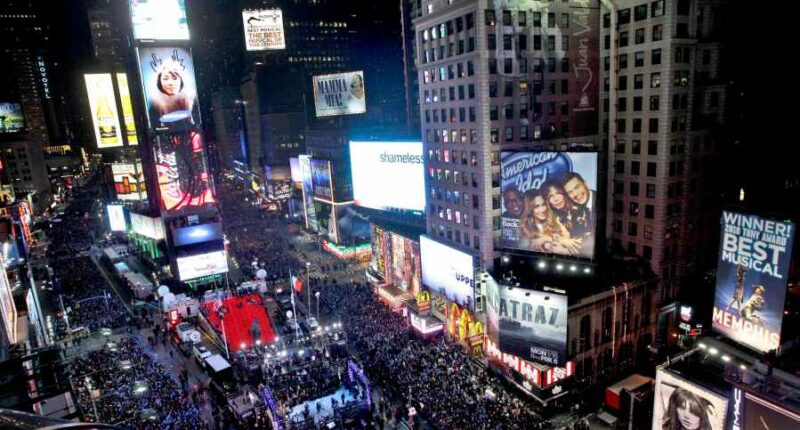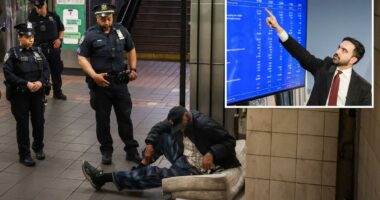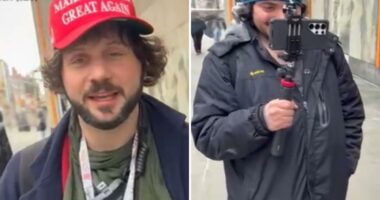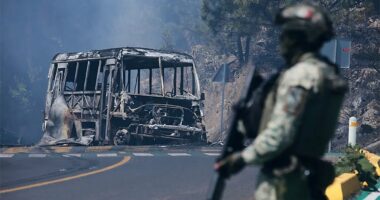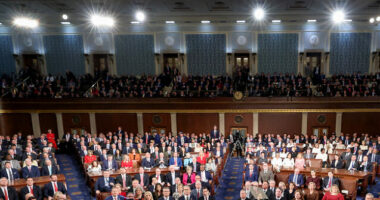Share this @internewscast.com

NEW YORK (AP) — No guns for Elmo, Spider-Man or anyone else in New York’s Times Square — and don’t try sneaking them into the subway, either.
A federal appeals court decided on Friday to uphold a New York state law that prohibits firearms in designated “sensitive” places. These include famous sites like Times Square, often referred to as “the crossroads of the world,” as well as the New York City subway system and commuter trains.
The 2nd U.S. Circuit Court of Appeals upheld a 2023 judgment by a lower court judge, which allowed the state law to stay in force despite a lawsuit filed by several gun owners questioning the constitutionality of certain restrictions. A previous year’s appeals court decision had already permitted other parts of the law to continue being enforced.
Lawsuit filers Jason and Brianna Frey, along with William Sappe, sought a preliminary injunction to block enforcement of parts of the law, called the Concealed Carry Improvement Act. This law enables authorities to declare Times Square a “Gun Free Zone,” prohibits open carry, and mandates a special permit for carrying guns in New York City.
U.S. District Judge Nelson Stephen Roman rejected that request, leading to the appeal decided Friday.
The 2nd Circuit’s three-judge panel concluded that the disputed restrictions align with the nation’s “historical tradition of gun regulations” and do not infringe upon the Second Amendment’s right to bear arms. They expressed that the plaintiffs are “unlikely to succeed on the merits” of their case.
Times Square gun ban consistent with history, judges say
The ban on guns in Times Square, a bustling area in midtown Manhattan filled with tourists and costumed characters, reflects a long history, even dating back to medieval England, of forbidding firearms in heavily populated areas, noted the judges in their unanimous decision. This reasoning also applies to the subway and Metro-North commuter trains, which link the city to northern suburbs and Connecticut.
“There is perhaps no public place more quintessentially crowded than Times Square,” the judges declared, likening its lively, billboard-filled environment to “our modern-day, electrified, supersized equivalent of fairs, markets, and town squares of old.”
Despite that, Judges Robert D. Sack, Reena Raggi and Joseph F. Bianco noted that they were not determining “the ultimate constitutionality of the challenged provisions.” They returned the case to Roman’s court for further proceedings.
Sack was appointed to the appeals court by President Bill Clinton, a Democrat; Raggi was appointed by President George W. Bush, a Republican; and Bianco was appointed by President Donald Trump, a Republican.
“The Second Circuit decision is disappointing, but not unexpected considering its palpable disdain for the Second Amendment,” said Amy Bellantoni, a lawyer for the plaintiffs.
New York Attorney General Letitia James, whose office defended the law in court, said in a statement: “New Yorkers deserve to feel safe on public transportation and everywhere in our state, and today’s decision affirms that right.”
“Common-sense gun laws save lives, keep guns out of sensitive community spaces, and help address the gun violence crisis,” said James, a Democrat. “New York has some of the strongest common-sense gun laws in the nation, and my office will continue to defend them and protect New Yorkers.”
Ruling is the latest one upholding New York law
Friday’s decision is the latest court ruling allowing the Concealed Carry Improvement Act to remain in place, and it echoed rulings that have echoed similar restrictions in other places. The New York law was signed in 2022 as the state’s answer to a U.S. Supreme Court ruling that some of its previous gun regulations were unconstitutional.
Gov. Kathy Hochul, a Democrat, and state lawmakers rewrote the regulations after the high court struck down the state’s longstanding requirement that people demonstrate an unusual threat to their safety to qualify for a license to carry handguns outside the home.
Last year, the 2nd Circuit upheld other parts of the law, including requirements that concealed carry permit applicants demonstrate good moral character, disclose the names of household and family members, submit to an in-person interview, provide character references and undergo 16 hours of training.
In that ruling, the appeals court also upheld provisions banning the concealed carry of firearms in certain sensitive places and allowing private property owners to post signs prohibiting guns on their property.
Federal appeals courts around the country have ruled similarly in other states, including Hawaii and Virginia, and on Sept. 10, the 3rd U.S. Circuit Court of Appeals upheld New Jersey’s ban on guns in sensitive places like schools and public gatherings. Those judges also cited a historical tradition of gun regulation, writing that for certain “discrete locations” the presence of guns was “historically regulated as jeopardizing the peace or posing a physical danger to others.”
